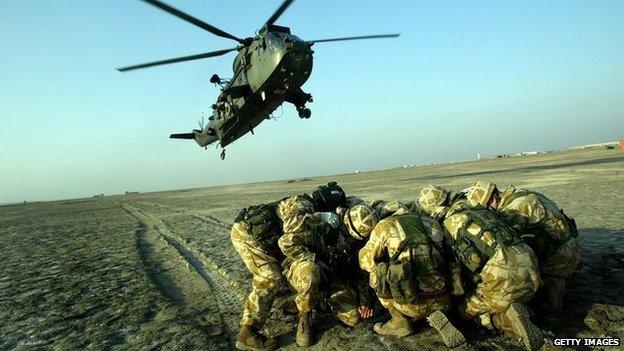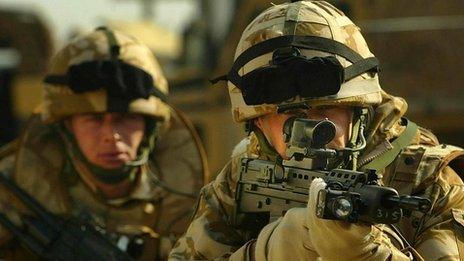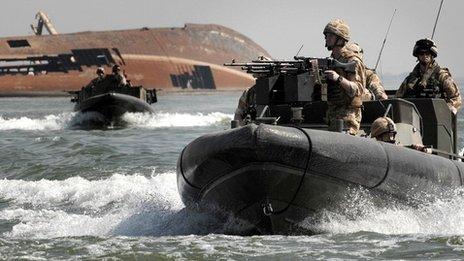Iraq Inquiry: Time to publish findings, says Nick Clegg
- Published

It is time to "get on" with publishing the findings of the Iraq Inquiry, which began its work almost five years ago, Nick Clegg has said.
The panel, under Sir John Chilcot, has become involved in arguments with Whitehall officials over which documents can be disclosed.
The deputy prime minister said Sir John would like to finish his work "as soon as possible".
The Cabinet Office said discussions over documents should end "shortly".
The inquiry was set up in June 2009 and heard from final witnesses in February 2011.
It examined the background to the war, the conduct of military operations, post-war planning and the UK's role in post-war security and governance until British troops left in 2009.
Those giving evidence included former Prime Minister Tony Blair, his ex-communications chief Alastair Campbell and former Foreign Secretary Jack Straw.
The Independent newspaper, external suggested that the report - originally expected before the end of 2011 - might not be produced until early next year, potentially making Iraq an issue in the general election.
'Very sensitive'
At his monthly press conference, Mr Clegg - who was not an MP in 2003 and whose Liberal Democrat party opposed the war - said: "Clearly I think everybody would like, after this very long period of time, for the Chilcot inquiry to be published.
"I'm sure Chilcot himself would like to get on with it as quickly as possible because he has been at this now for a long period of time."
He added: "I can't comment on exactly the reasons why, given that there was a lot of toing and froing about what is finally produced in published form in the report, exactly what the hold-up now is.
"This involves a lot of people, it involves a lot of legalities and of course deals with a very, very sensitive issue.
"But I really do hope now that everybody involved, including those who know they will be subject to renewed scrutiny within the Chilcot report, that they will now accept that it is just time to get this report published so that the record can be scrutinised in the most objective way possible."
Mr Clegg also said: "This was one of the most momentous, in my view one of the most catastrophic decisions in British foreign policy - I would say the most catastrophic decision - since Suez.
"It is quite right that as a country we learn the lessons, we understand the truth and that those who might not like to be subject to further scrutiny subject themselves to the further scrutiny which will be included in the Chilcot report."
Syria
In a statement last November Sir John said that he was waiting for the "satisfactory completion of discussions between the inquiry and the government on disclosure of material that the inquiry wishes to include in its report or publish alongside it".
A spokesman for Mr Blair said: "If Nick Clegg is implying Tony Blair is the reason for the delay, that is completely wrong. Tony Blair has as much reason as anyone for wanting the report published.
"Not least because it gives him a chance to defend himself against Nick Clegg's assertion that removing Saddam Hussein from power was 'the most catastrophic decision since Suez,' whilst daily the consequences of inaction over Syria become ever more apparent."
A spokesman for the Cabinet Office, which co-ordinates the running of government, said: "The Chilcot inquiry has had full unfettered access to all government papers.
"The Cabinet Office has been in a constructive dialogue with the inquiry team over recent months, with a clear view to meeting their declassification requests.
"This has involved several thousand documents, subject only to ensuring that national security and foreign policy objectives are not compromised as provided for in the protocol agreed at the outset of the inquiry. That process should be concluded shortly."
- Published30 December 2013

- Published6 November 2013

- Published22 April 2013

- Published16 July 2012

- Published5 July 2016
